Join Our Newsletter To Be Informed When New Videos Are Posted
Join the thousands of fellow Studends who rely on our videos to learn how to read the bible in Hebrew for free!
Hebrew Text
וַיִּבְחַר־לוֹ לוֹט אֵת כָּל־כִּכַּר הַיַּרְדֵּן וַיִּסַּע לוֹט מִקֶּדֶם וַיִּפָּרְדוּ אִישׁ מֵעַל אָחִיו׃
English Translation
Then Lot chose him all the plain of the Yarden
Transliteration
Va-yivchar-lo Lot et kol-kikar ha-Yarden va-yisa Lot mi-kedem va-yiparedu ish me-al achiv.
Hebrew Leining Text
וַיִּבְחַר־ל֣וֹ ל֗וֹט אֵ֚ת כׇּל־כִּכַּ֣ר הַיַּרְדֵּ֔ן וַיִּסַּ֥ע ל֖וֹט מִקֶּ֑דֶם וַיִּפָּ֣רְד֔וּ אִ֖ישׁ מֵעַ֥ל אָחִֽיו׃
וַיִּבְחַר־ל֣וֹ ל֗וֹט אֵ֚ת כׇּל־כִּכַּ֣ר הַיַּרְדֵּ֔ן וַיִּסַּ֥ע ל֖וֹט מִקֶּ֑דֶם וַיִּפָּ֣רְד֔וּ אִ֖ישׁ מֵעַ֥ל אָחִֽיו׃
🎵 Listen to leining
Parasha Commentary
📚 Talmud Citations
This verse is quoted in the Talmud.
📖 Horayot 10b
The verse is referenced in a discussion about the consequences of Lot's choice and its implications for future generations.
📖 Sanhedrin 109b
The verse is cited in the context of discussing the moral and ethical lessons derived from Lot's decision to separate from Abraham.


Lot's Choice of the Jordan Plain
The verse states: "Then Lot chose him all the plain of the Yarden, and Lot journeyed eastward, and they separated, each man from his brother" (Bereishit 13:11). This decision marks a pivotal moment in the relationship between Avraham and Lot, with significant moral and spiritual implications.
Rashi's Explanation
Rashi (Bereishit 13:11) explains that Lot's choice was driven by materialistic desires. The plain of the Jordan was lush and fertile, resembling "the garden of Hashem" (Bereishit 13:10), but it was also the future location of Sodom and Gomorrah—a place of great wickedness. Rashi emphasizes that Lot prioritized wealth and comfort over spiritual values, leading him to associate with corrupt societies.
Ramban's Insight
Ramban (Bereishit 13:10) adds that Lot's decision was not merely about land quality but reflected a deeper moral failing. By choosing the Jordan plain, Lot distanced himself from Avraham's righteous influence, ultimately leading to his downfall in Sodom. The phrase "they separated, each man from his brother" underscores the spiritual rupture caused by Lot's choice.
Midrashic Perspectives
Halachic and Ethical Lessons
The episode serves as a cautionary tale about the dangers of prioritizing material gain over spiritual integrity. The Talmud (Eruvin 19a) warns that associating with wicked communities, even for economic benefit, can lead to moral compromise. Lot's choice ultimately forced him into exile and suffering, illustrating the consequences of misplaced priorities.